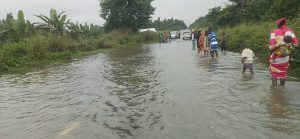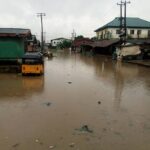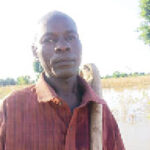By Hajara Husseini
Floods are the most frequent type of natural disaster and occur when an overflow of water submerges land that is usually dry. Floods are often caused by heavy rainfall, rapid snowmelt or a storm surge from a tropical cyclone or tsunami in coastal areas.
Floods can cause widespread devastation, resulting in loss of lives and damage to personal property and critical public health infrastructure.
According to the World Health Organisation (WHO), between 1998 and 2017, floods affected more than 2 billion people worldwide. People who live in floodplains or non-resistant buildings or lack warning systems and awareness of flooding hazards are most vulnerable.
The WHO also noted that 80 to 80 per cent of all documented disasters from natural hazards during the past 10 years had resulted from floods, droughts, tropical cyclones, heat waves and severe storms. Floods are also increasing in frequency and intensity and the frequency and intensity of extreme precipitation are expected to continue to increase due to climate change.
In Nigeria, the Annual Flood Outlook, which was unveiled in March 2022 by the Nigeria Hydrological Services Agency (NIHSA), predicted that 233 local government areas in 32 states of the federation and the Federal Capital Territory (FCT) fell within the highly probable flood risks areas, while 212 local government areas in 35 states, including the FCT, fell within the moderately probable flood risk areas.
It indicated that the highly probable flood risk states were Adamawa, Abia, Akwa-Ibom, Anambra, Bauchi, Bayelsa, Benue, Cross River, Delta, Ebonyi, Ekiti, Edo, Gombe, Imo, Jigawa and Kaduna.
Others were Kano, Kebbi, Kogi, Kwara, Lagos, Nasarawa, Niger, Ogun, Ondo, Osun, Oyo, Rivers, Sokoto, Taraba and Yobe, as well as Zamfara and the FCT.
Meanwhile, a recent flood prediction by the Nigeria Meteorological Agency (NiMet) predicted imminent high-risk flooding in parts of Kaduna, Borno, Delta and Bayelsa states between now and October 2022. It, however, stated that flooding was already ravaging some communities in Jigawa and Sokoto states following increased rainfall in the last days of August, as hundreds of houses and swathes of farmlands were ravaged by flood.
States such as Kebbi, Zamfara, Niger and the western parts of Kaduna fall under the medium-risk areas, with parts of Plateau, Nasarawa and Taraba states, southern Borno and Yobe states falling under low risk to flooding.
Also, states in the North East will experience above-normal rainfall conditions in the next three months.
Flooding has increased the number of deaths and displaced persons in the country. In August alone, it killed at least 50 people, with many displaced in Jigawa, forcing people into temporary camps.
The National Emergency Management Agency boss urged state and local emergency management agencies to be proactive as he would ensure effective and efficient flood preparedness, mitigation and response to flood-affected areas.
While all that are necessary, it is also important to put measures such as the building of dams, wing dikes, diversion spillways, improved drainage and water retention basins, among others into place to reduce the risk of floods in those areas.
The government should put efforts into creating aggressive awareness campaigns, especially in those high-risk areas to mitigate further occurrences.
They should also ensure proper planning when building drainages in urban areas and improve afforestation as it is one of the best ways to prevent floods.
The government, as well as citizens, should take environmental sanitation personally. And there should be a swift response to victims in areas affected by floods to avoid recording more deaths and displacement of residents.

 Join Daily Trust WhatsApp Community For Quick Access To News and Happenings Around You.
Join Daily Trust WhatsApp Community For Quick Access To News and Happenings Around You.


